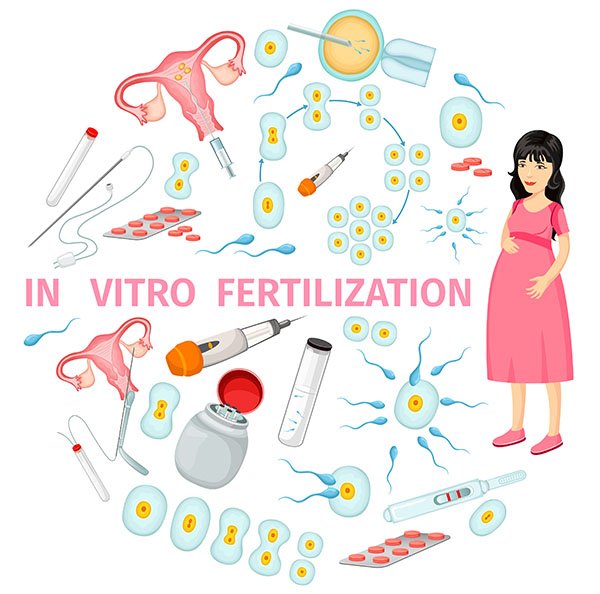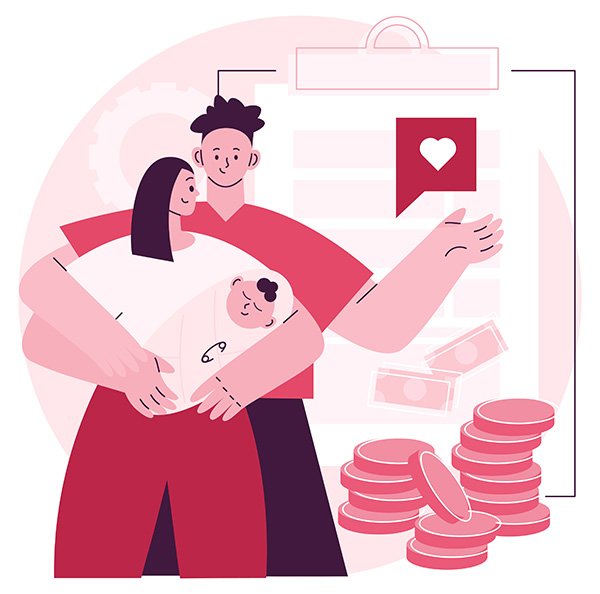
What is In Vitro Fertilization (IVF)
In vitro fertilization, commonly referred to as IVF, is a beacon of hope for many couples facing infertility. As a type of assisted reproductive technology (ART), IVF helps individuals and couples achieve parenthood by fertilizing eggs with sperm outside the body (in vitro) and then transferring the resulting embryos to the uterus for implantation and pregnancy.
The IVF Journey: A Step-by-Step Guide
The IVF journey, a path to parenthood for many couples struggling with infertility, can be broken down into several key stages. The first step involves a consultation and evaluation with a fertility specialist. During this initial meeting, you’ll have the opportunity to discuss your fertility concerns, medical history, and desired outcomes. The specialist will likely recommend a battery of tests for both partners to assess your individual fertility potential. These tests may include blood tests to check hormone levels and sperm quality, and ultrasounds for the woman to evaluate ovulation and uterine health.
- Consultation & Evaluation: Discuss fertility, medical history, and undergo tests.
- Stimulation & Monitoring: Medications stimulate egg production, monitored by blood tests and ultrasounds.
- Egg Retrieval: Mature eggs are retrieved from the ovaries using a guided needle.
- Sperm Collection: Semen sample is provided by the male partner.
- Fertilization: Sperm and eggs are combined for fertilization (conventional or ICSI).
- Embryo Development: Fertilized eggs (embryos) develop in a controlled environment.
- Embryo Selection: The healthiest embryos are chosen for transfer.
- Embryo Transfer: Selected embryos are transferred into the uterus.
- Luteal Phase Support: Medications support the uterine lining for implantation.
- Pregnancy Testing: A blood test checks for pregnancy hormone.
- Prenatal Care: Regular checkups ensure a healthy pregnancy (if confirmed).
- The rest of your response is excellent and does not require edits.
Cost of IVF Procedure 2024
The cost of IVF treatment in India can vary significantly depending on several factors, including the chosen clinic, location, and specific procedures required. In 2024, a single IVF cycle in India typically ranges from ₹1,00,000 to ₹3,50,000 (approximately $1,200 to $4,200 USD). This cost excludes medication, which can add another ₹30,000 to ₹50,000 (approximately $360 to $600 USD). Additional services like intracytoplasmic sperm injection (ICSI), preimplantation genetic testing (PGT), or embryo freezing can further increase the overall expense.
Understanding the cost structure is essential for planning your IVF journey. At Srijan IVF, we believe in financial transparency. We provide you with a detailed breakdown of costs upfront and explore various payment options to suit your needs. We can also help you navigate any potential insurance coverage or financial assistance programs you might qualify for. Remember, the cumulative cost of multiple cycles can be substantial, so careful planning and exploring all financial options are crucial.
IVF Success Rates and Factors
The success rates of in vitro fertilization (IVF) can vary widely depending on numerous factors. Generally, the live birth rate per IVF cycle ranges from 35% to 50%, but individual success can be influenced by age, with younger women typically experiencing higher success rates. Other critical factors include the underlying causes of infertility, embryo quality, and the experience of the fertility clinic. Lifestyle factors such as smoking, alcohol consumption, and weight also play a significant role. Additionally, the use of advanced techniques like preimplantation genetic testing (PGT) can improve outcomes by ensuring the transfer of genetically viable embryos.


Financing options for IVF Treatment
Facing the financial burden of IVF shouldn’t prevent you from building your family. At Srijan IVF, we understand this. We offer a variety of financing options to make your IVF journey more accessible. This includes flexible payment plans, partnerships with third-party lenders, and even bundled packages that reduce the cost per cycle.
We also recognize that some situations require extra support. Srijan IVF may offer financial assistance programs or discounts for specific groups like military personnel, healthcare workers, or those facing financial hardship. Don’t hesitate to discuss your options with us. Our goal is to help you achieve parenthood, and finding the right financial approach is an important part of that journey.
FAQs
2. What are the IVF success rates by age?
IVF success rates are significantly influenced by age. Here's a general breakdown:
- Women under 35: Highest success rates, typically around 40-50%
- Women 35-37: Success rates start to decline, ranging from 30-40%
- Women 38-40: Success rates drop further, typically around 20-30%
- Women over 40: Success rates fall below 10%
